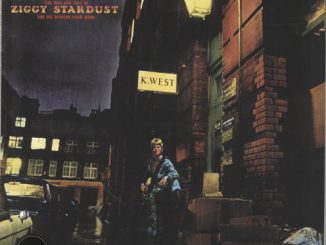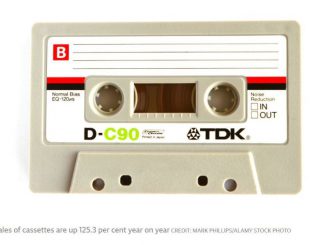Blackstar doesn’t carry quite the same element of surprise as The Next Day – but it is the sound of an unknowable artist steadfastly ignoring his own past

Next month, David Bowie’s 25th album arrives in a manner not unlike that of his 2013 comeback, The Next Day. Like Where Are We Now?, the single that announced Bowie’s re-entry into the recording world, Blackstar is released on his birthday, 8 January. As with The Next Day, a degree of secrecy has surrounded the project – in October, a British newspaper story professing to reveal details about the album was tetchily dismissed as “inaccurate reporting” on Bowie’s Facebook page – and Bowie himself seems happy to remain at a considerable remove from his own album release.
The promotional interviews have once more been handled by his longstanding producer, Tony Visconti, sleeve designer Jonathan Barnbrook and one of the supporting musicians, Donny McCaslin, the New York-based saxophonist who appeared on the 2014 single Sue (Or in a Season of Crime) and whose electro-acoustic quartet – best known for covering tracks by electronica artists Boards of Canada and Aphex Twin – makes up the core of Bowie’s Blackstar backing band. This time, Bowie doesn’t even appear on his own album sleeve – a career first.
You can see why Bowie might want to replicate the release of The Next Day. The sudden, unheralded appearance of Where Are They Now? might well have been the single most innovative thing about the album, and certainly proved the most influential: everyone from Beyoncé to U2 subsequently attempted to mimic it, with varying degrees of success. Equally, you can understand why there’s noticeably less secrecy about this album than its predecessor: Bowie himself hinted at its appearance in two statements last year, while its making has been the subject of lengthy cover stories in two UK rock magazines. Both features emphasise the project’s leftfield nature (as, in fact, did that story dismissed for its inaccurate reporting): the message that Blackstar is made of different and far more experimental stuff to its predecessor is clearly one that Bowie is keen to get across, albeit from a distance.

To that end, the album has been trailed by its three least commercial tracks, which in addition make up the bulk of its first half. Sue (Or in a Season of Crime) offered pained vocals and skronking jazz over a rhythm based on an obscure late-1990s drum’n’bass track that may well have piqued Bowie’s interest because it was by Plastic Soul, the name he gave to the sound of 1975’s Young Americans. The version on Blackstar is noticeably less heavy-going than the single, its performance more streamlined and guitar heavy. Its B-side, ’Tis A Pity She Was a Whore, has also undergone a substantial revamp, although in the opposite direction the rerecording features the pummelling, hugely impressive sound of McCaslin’s quartet playing at full pelt.
The episodic, 10-minute title track, meanwhile, is alternately gorgeous, disturbing and utterly confounding – although one interpretation of its meaning has been suggested by McCaslin, who claimed it was inspired by the rise of Isis, though Bowie’s spokesperson has denied that interpretation. Nevertheless, it would certainly fit the Arabic drones that open the track, the talk of executions in the lyrics and the track’s intermittent sense of dread: it’s certainly not beyond the bounds of possibility that the blackstar of the lyrics is Abu Bakr al-Baghdadi, “treading on sacred ground” by announcing a worldwide caliphate.
Whatever the song is about, the fact that it’s clustered together with Sue and ’Tis Pity She Was a Whore at the album’s beginning – broken up by the more conventional, emotive Lazarus – sends out the same message to the listener as the one imparted in interviews by Visconti. “This is fresh. This came from a different space,” he has said. “[On The Next Day] definitely we did reference older things when we weren’t sure … The Next Day started out trying to do something new, but something old kept creeping in. Not this album. David on purpose used Donny so that wouldn’t happen.”
The rest of Blackstar isn’t as challenging as that – the ballad Dollar Days is just limpidly beautiful – but on first listen, it’s certainly far less immersed in Bowie’s past than The Next Day, which from its cover to its lyrics kept alluding to the singer’s history, as if part of his preparation for re-emergence involved reminding himself of the artist he had once been. Nevertheless, Visconti’s assertion that nothing on Blackstar recalls Bowie’s back catalogue isn’t quite right. The lyrics that appear over the robotic rhythm track of Girl Loves Me are packed with Nadsat, the slang Anthony Burgess invented in 1962 for A Clockwork Orange, an abiding obsession of Bowie’s in the Ziggy Stardust era (Visconti has also suggested they’re inspired by Polari, the slang language used in gay subcultures with which Bowie peppered his interviews in the early 1970s).
More obviously, the introduction to I Can’t Give Everything Away offers a direct musical lift from A New Career in a New Town, the instrumental that closed the first side of 1977’s Low with a burst of breezy optimism and forward motion at odds with the gloom and paranoia elsewhere on that album. Whether it’s there to link Blackstar with the experimentation of Bowie’s lauded Berlin Trilogy or to suggest that Bowie sees himself pressing on into the unknown is an intriguing question, one which the title and lyrics suggest isn’t going to get a straight answer any time soon. “Saying no but meaning yes, that is all I ever meant, that’s the message that I sent,” he sings, sounding rather proud of how unknowable he’s become, at the end of an album that counts as unexpected left turn, executed with enviable aplomb, that only deepens the mystery further.
- This article was amended on 18 December 2015 to include David Bowie’s spokesperson’s denial that Blackstar was inspired by the rise of Isis.
Via the Guardian
Find rare Bowie vinyl, CDs, memorabilia, merchandise and more at eil.com




Be the first to comment